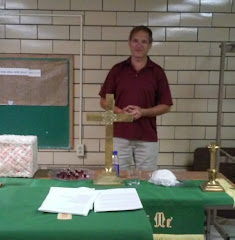When I tell
people that I’ve been to Ghana, they often ask about the poverty that we see
there. After all, Africa is famous for being
poor. And yes, there is poverty in
Ghana. But there is also affluence. Becky and I saw cars, homes, and clothes in
Ghana that we could never hope to afford.
The prices in some of the stores we visited were way out of our range. What struck us even more than the poverty was
the contrast: well-heeled businessmen driving sleek black SUVs past people
living in shacks by the ditch, and children with nothing but a ball of tape for
a soccer ball playing outside a beautiful resort. We asked ourselves, “How can such stark
contrast exist in Ghana? How can the
affluent live with themselves when confronted with such desperate need?” It baffled and bothered us.
As we talked
about it, we realized that the gap between the rich and the poor is just as
real in the US as it is in Ghana.
According to a 2011 study by Duke University and the Harvard Business
School, the richest 20% of Americans own 84% of our nation’s wealth, while the
poorest 40% own only 0.3%. And the gap
is growing: over the past 20 years, poor Americans have actually gotten poorer,
while the rich have gotten richer. Even
more troubling is the study’s finding that most Americans have no idea how big
the difference is between the wealthy and the poor in our country.
Becky and I saw
the contrast between the rich and the poor in Ghana, while rarely noticing in
the US, for two reasons. First, we do a
better job of hiding the poor from sight in our country. The rich and middle class live in certain
areas, and the poor live somewhere else.
If you don’t go to certain
neighborhoods and communities, you don’t have to see them. And second, we’ve trained ourselves not to
see them. We’ve learned how to ignore
the needy until we don’t even notice that they exist. At the monthly deacons meeting, we struggle
to identify people that we can help.
They’re in our community, but we don’t see them. Becky and I noticed the contrast in Ghana
only because we were in a different culture, where we didn’t know how to ignore
what we didn’t want to see.
Politicians
may engage in or accuse each other of “class warfare,” but for us Christians
this is a wake-up call to do something.
In the parable of the sheep and goats (Matthew 25:31-46), Jesus cursed
the goats because they failed to help him when he was hungry, thirsty, a
stranger in need of clothes, sick and in prison. Perplexed, they responded, “Lord, when did we
see you hungry or thirsty or a stranger or needing clothes or sick or in
prison, and did not help you?” They did
not help, because they did not see the need.
They were blind to the poor and distressed people all around them. I’m ashamed to say that those goats sound an
awful lot like me.
Thankfully,
we worship a Lord who gives sight to the blind and wisdom to the foolish. I urge you to seek the Lord’s help to open
your eyes to the need that surrounds us, so that you may respond with the love
and justice of Christ.



